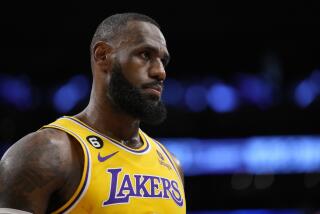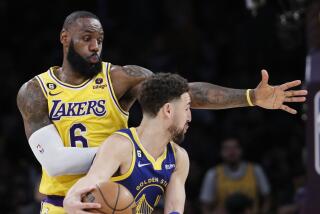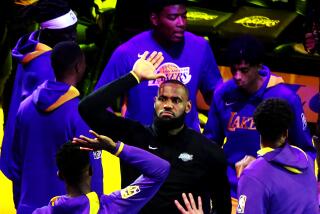Not All Teams Reap Free Agency’s Benefits
- Share via
They aren’t wealthy enough to repel the high cost of living, or poor enough to get a tax break. That’s the American middle class, wedged between prosperity and despair, rich enough to live comfortably but not ostentatiously.
Then there’s the NBA middle class.
This group started to shrink this summer and may be an endangered species soon. The current labor rules and the method of spending by general managers have begun to create a two-class system. The current trend suggests team rosters soon may be split between the maximum-wagers and minimum-wagers.
Players such as Shaquille O’Neal, Juwan Howard, Chris Webber and Larry Johnson make the salaries of megastars, whether they are or aren’t. They’re taking up precious cap room and leaving their teams with nothing but this low-cost alternative: Fill out the rest of the roster with players making the $247,500 minimum.
The shrinking of the middle class is evident, because several free agents who aren’t stars but who would get reasonable minutes on most teams are having or have had trouble finding work.
At least a dozen free agents who started most of last season or had a solid spot in a rotation are adrift. They’ll be lucky if they get half the salary they played for. Some may be forced to turn to Europe, others to the Continental Basketball Association, and some others maybe even to retirement.
Here are some examples of not-so-fortunate members of this class:
--Brian Williams. He is coming off the most productive season of his five-year career, having averaged 15.8 points and nearly eight rebounds for the Los Angeles Clippers. In a league in which big men with marginal skills are often rewarded immensely--Jim McIlvaine will earn more than $4 million with the Seattle SuperSonics--Williams, at 6-foot-11 and capable of playing center or power forward, should’ve been under contract before Labor Day.
But he found himself behind such coveted free-agent front-line players as Howard, O’Neal and Alonzo Mourning. He ran out of options, and leverage, when center-starved teams searched elsewhere. Now, he must re-sign with the Clippers or take a hefty pay cut with another team, such as the Cleveland Cavaliers.
--Walt Williams. An all-around player who hasn’t fulfilled his promise, Williams was squeezed out in the numbers crunch in Miami. He’s too talented for a $247,500 salary slot, but that’s what he signed for last week with the Toronto Raptors.
--Rex Chapman. Like Walt Williams, Chapman was lost in the Miami summer shuffle. Heat President and Coach Pat Riley had a chance to sign both players after the Howard deal collapsed but elected to pass and went for Dan Majerle instead. Chapman has value as a backup on a good team--his sometimes-horrendous shot selection makes him a liability as a starter. But his best opportunity to make millions died with the Heat.
--Oliver Miller. He gets the award for Dumbest Business Decision of the Year by opting out of the last two years (at $2.6 million and $2.9 million) of his contract with the Raptors to explore free agency. With a chronic weight problem and a questionable attitude scaring away teams, Miller should’ve known better.
--J.R. Reid. He’s better than several power forwards sitting on NBA benches, and chances are good he’ll be making less money, too. The New York Knicks acquired Reid in midseason for the sole purpose of using his money in the offseason to sign other free agents, such as Allan Houston and Chris Childs.
--Spud Webb. Have we seen the last of the world’s most unlikely dunker? The lack of available money may send Spud into orbit.
Among the others whose fates were still uncertain entering the week: Kenny Smith, Willie Anderson, Eric Murdock, Ty Corbin and Anthony Bowie.
More to Read
Get our high school sports newsletter
Prep Rally is devoted to the SoCal high school sports experience, bringing you scores, stories and a behind-the-scenes look at what makes prep sports so popular.
You may occasionally receive promotional content from the Los Angeles Times.






